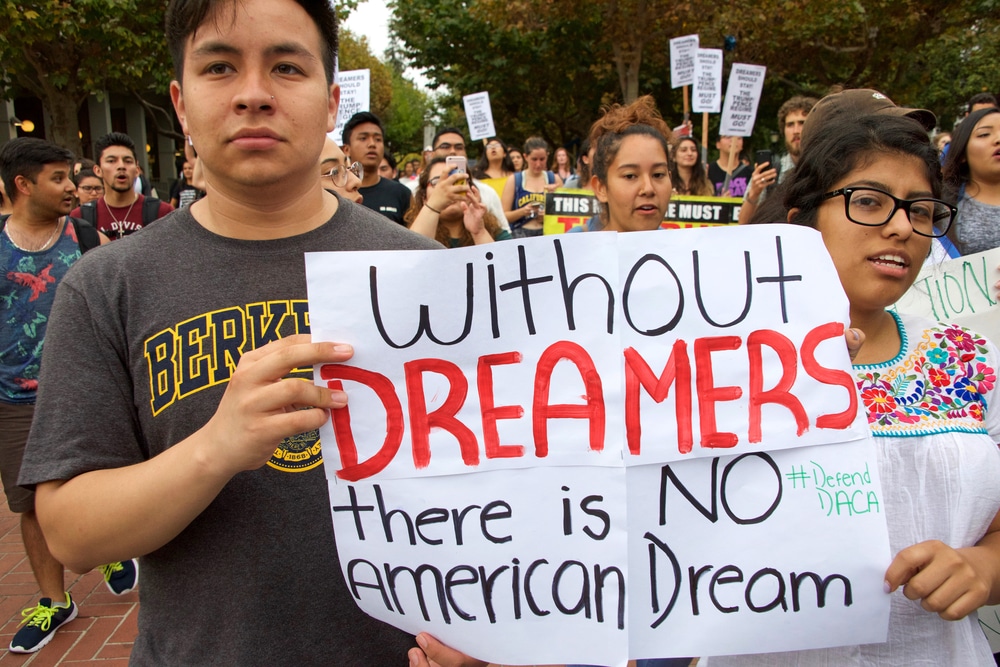As the Trump administration intensifies its mass deportation programs — opening up schools and churches to ICE raids and even having masked agents snatch people off the streets — immigrant rights advocates say now is the time for Congress to pass the DREAM Act.
Make the Road PA is one of nearly 120 organizations who support Congresswomen Sylvia Garcia (D-TX-29) and Pramila Jayapal’s (D-WA-07) reintroduction of the American Dream and Promise Act, which aims to provide a pathway to citizenship for nearly 2 million undocumented young people, including DACA recipients and those eligible for DACA.
The legislation is a needed step toward a permanent solution for immigrant communities that have long lived under the shadow of uncertainty.
“It is inconceivable that after decades of promises and political posturing, Congress has yet to pass a permanent solution for undocumented immigrants who entered the country as children and other undocumented people,” said Armando Jiménez, deputy organizing director at Make the Road PA.
The Bucks County Beacon emailed and called Congressman Brian Fitzpatrick’s office, but they did not return a request for comment. The bill has bipartisan support and 202 co-sponsors in the House; Fitzpatrick is not one of them.
Julio Rodriguez, Political Director for Pennsylvania Immigration Coalition (PIC), said the passage of this act is long overdue.
“The last immigration reform was in 1986; as a result, there are various statuses and programs immigrants need to navigate,” said Rodriguez. “By passing the American Dream and Promise Act, millions of individuals could travel freely and truly integrate into the U.S. by buying a home, attending college, and investing their talents into the U.S. That is difficult to do when you don’t know if you are going to be here tomorrow.”
With the recent executive orders, immigrants who were granted temporary lawful status are no longer considered legal under expedited removal which seeks to remove immigrants in the U.S. who have been in the country less than two years.
“Many immigrants have played by the rules seeking lawful pathways like asylum and their programs are being cancelled and their applications are being halted overnight,” said Rodriguez. “Unfortunately, the trend is immigrants are legal today and tomorrow they are not.”
Rodriguez said lawmakers are failing to act due to many reasons, primarily a lack of understanding of immigration and all the benefits increased immigration has. “There are unfortunately some lawmakers who choose xenophobia over helping support individuals and improving the economy through the numerous contributions immigrants make to the U.S.,” he said.
Undocumented people face the onslaught of executive orders affecting them and their families.
“Just recently a U.S. resident was detained at Columbia University,” said Rodriguez. “Many families are in mixed status families, where 1 in 3 U.S. citizen children have one parent who is not a U.S. citizen. DACA recipients live here in the U.S. and often do not have ties back to the country where they were born. The average undocumented individual has been in the U.S. over 5 years, with close to 20% being here over 20 years.”
Rodriguez added that the U.S. accepts their taxes but treats them as subhuman through targeted detention and deportation. And most recently releasing a registry requiring undocumented immigrants to face criminal penalties.
The bipartisan American Dream and Promise Act of 2025 would:
- Protect and grant eligible Dreamers conditional permanent residence for ten years and cancel removal proceedings
- Provide a pathway to citizenship for eligible Dreamers by granting full Lawful Permanent Resident (LPR) status
- Provide individuals with Temporary Protected Status (TPS) or Deferred Enforcement Departure (DED) with LPR status
- Protect Dreamers and individuals with TPS or DED during their application for relief under the American Dream and Promise Act
- Provide eligible Dreamers with access to federal financial aid
- Allow eligible Dreamers located abroad to apply for relief
- Prevent penalizing states that grant in-state tuition to undocumented students based on residency
“The passage of this act would provide much needed stability and opportunities for undocumented individuals, particularly DACA recipients and those eligible for DACA,” said Amy Jones (pseudonym), a former student at Johns Hopkins Bloomberg School of Public Health who works at a refugee assistance organization in Pennsylvania. “Whether it’s DACA recipients, asylum seekers or refugees, they all have a dream — they want to be settled down, they want to have legal citizenship.”
Jones said the passage of this act would offer a clear pathway to citizenship, allowing them to work legally, access higher education without fear of deportation and fully contribute to their communities. “It is going to strengthen families’ bonds; they can have opportunities to start their business, have a good job and eventually it is going to boost the American economy,” she said.
READ: The Vanished Asylum Seekers Disappeared by Trump Administration Policy
Jones thinks lawmakers have failed to act because of the political divisions and the use of immigration reform as a partition issue.
“Despite the broad public support for a permanent solution for dreamers, this legislative inaction is due to other priorities: misinformation, fear mongering, messages around immigration policies,” said Jones. “And a lot of backlash from opponents and lack of bipartisan agreement that has skipped many reforms and stalled for years.”
Undocumented individuals face challenges, said Jones, including job insecurity, limited access to healthcare, fear of deportation, and barriers to higher education. “They sometimes might experience discrimination due to the language barrier and difficulty accessing public services,” she said. “This uncertainty surrounding their legal status creates distress affecting their wellbeing and ability to plan for the future.”






